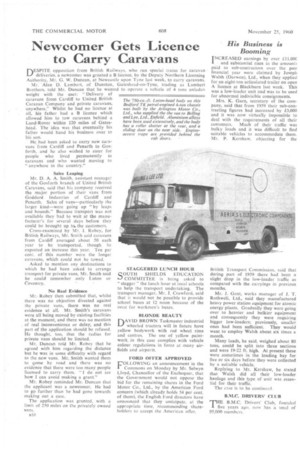His Business is Booming
Page 44

If you've noticed an error in this article please click here to report it so we can fix it.
INCREASED earnings by over £11,00C
I and substantial rises in the amounts paid to sub-contractors over the past financial year were claimed by Joseph Walsh (Darwen), Ltd., when they applied for an eight-ton articulated trailer on open A licence at Blackburn last week. This was a low-loader unit and was to be used for abnormal indivisible consignments.
Mrs. K. Garn, secretary of the company, said that from 1959 their sub-contracting figures had increased by £3,000 and it was now virtually impossible to deal with the requirements of all their customers. Much of their traffic was bulky loads and it was difficult to find suitable vehicles to accommodate them. Mr. P. Kershaw, objecting for the British Transport Commission, said that during part of 1959 there had been a slight drop in the low-loader traffic as compared with the carryings in previous months.
Mr. 1. Gent, works manager of J. T. Rothwell, Ltd., said they manufactured heavy power station equipment for atomic energy plants. Gradually they were going over to heavier and bulkier equipment and consequently they were requiring bigger low-loaders; previously, smaller ones had been sufficient. They would want to employ Walsh about six times a month.
Many loads, he said, weighed about 80 tons, could be split into three sections and were 19-22 ft. high. At present these were sometimes in the loading bay for five or six days before they were collected by a suitable vehicle.
Replying to Mr. Kershaw, he stated that Walsh did all their low-loader haulage and this type of unit was essential for their traffic.
The case is to be continued.




















































































































